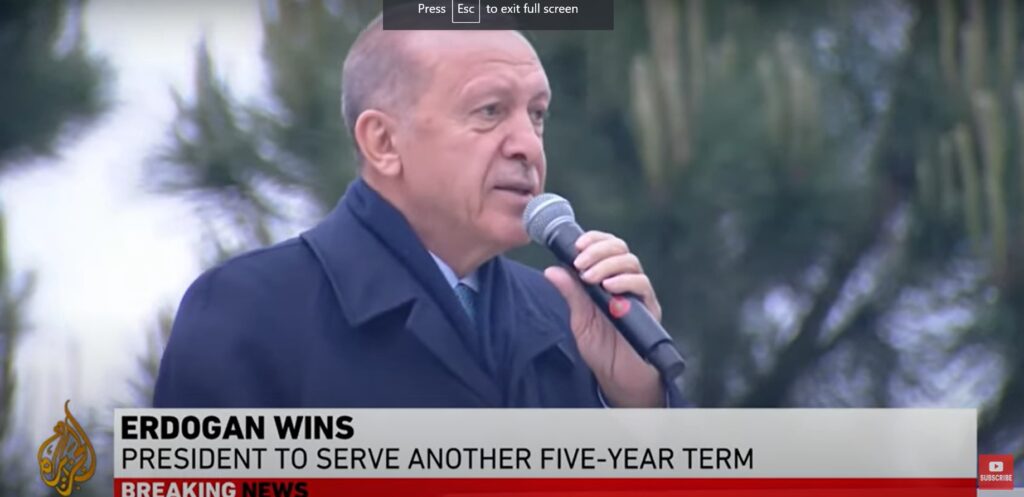The presidential elections in Turkey ended with the victory of President Recep Tayyip Erdoğan who received 52.2 of the votes in the second round compared to 47.8 of the votes received by his political opponent and opposition candidate Kemal Kaljadar Ogulu.
The coalition headed by Erdogan also managed to keep the majority in the parliament and has 323 seats out of 600.
With such a political achievement, President Erdoğan can embark on a new path, in his victory speech he said that the winner of the election is 85 million Turks, he promised to rehabilitate the economy, deal with the increase in prices as a result of inflation, increase investments in the country and create jobs.
He faces a series of challenges.
- Improving the economic situation of Turkey and the daily life of its citizens, following the high inflation and the fall of the Turkish lira.
According to sources in Turkey, Erdoğan plans to return to the political arena the former minister of finance, Muhammad Shimshek, who is highly respected professionally in Turkey and in the international arena.
- Rehabilitating the damage of the great earthquake last February and handling the issue of Syrian refugees and illegal immigrants.
Erdoğan wants the return of a million Syrian refugees to their country with the financial aid of Qatar, which has pledged to finance places for them to live.
- The continuation of the war against the terrorist groups on Turkey’s borders.
- Maintaining the current coalition consisting of 6 parties and establishing a new government that will include new ministers according to the changed circumstances in Turkey.
- God. Maintaining regional stability and continuing the normalization process and reducing Turkey’s foreign affairs problems to the minimum possible, Egyptian President al-Sisi who congratulated President Erdogan on his victory in the elections has already announced the reopening of the embassies in both countries.
It seems that the Turkish president will continue his efforts to mediate between Russia and the Western countries.
The two main challenges facing the Turkish president, as things stand now, are the economic situation and illegal immigration to Turkey.
Another issue is Turkey’s relations with Syria, Erdogan wants to normalize relations with Bashar Assad’s regime, which demands the withdrawal of Turkish forces from Syria, but the presence of the Kurdish militias in Syria, which are considered by Erdogan as terrorist organizations, are a very difficult problem in the relations between Turkey and Syria.
The US and the Western countries are now expected to reevaluate their policy towards Turkey in view of Erdogan’s victory in the elections and the fact that they will have to deal with him in the next five years.
The Biden administration will try to prevent Turkey from joining the axis of Russia and China.
Turkey’s relations with Israel
Israel was not surprised by the victory of President Erdogan in the elections after he was able to gradually take control over the twenty years of his rule over all the centers of power in the country and above all the Turkish media, it is no secret that Turkey has largely lost the democracy it once had.
The assessment of the political echelon in Israel is that President Erdogan will continue the process that began a year and a half ago of normalizing relations with Israel, Prime Minister Netanyahu and President Herzog called him to congratulate him on his victory in the elections, political officials in Jerusalem say that even if the opposition candidate were elected in the elections, it is likely that the policy of normalizing relations with Israel would continue because this is the Turkish interest.
Erdogan’s current policy is to normalize relations with all the players in the region, led by Israel and Egypt, therefore Erdogan has already learned lessons from the crises he had with Israel in the past, despite being a senior representative of the global “Muslim Brotherhood” movement and an ardent supporter of the Hamas movement, he did not confront Israel against the background of the events at the Al-Aqsa Mosque during the last month of Ramadan, nor following the “Shield and Arrow” operation against the Islamic Jihad in the Gaza Strip.
He also did not intervene in the last election in Israel despite his negative attitude towards Prime Minister Netanyahu in the past.
The recent rapprochement between Israel and Azerbaijan, which is considered very close to Turkey, is important for President Erdogan and is a potential for the future in regards to the possibility of a tripartite alliance against Iran.
Israel is interested in strengthening normalization with Turkey and deepening economic and commercial ties with it, Israeli tourism is booming in Turkey.
If everything goes well, and despite the deep differences of opinion between the two countries on the Palestinian issue and the sediments of the past, one can certainly expect the invitation of President Erdogan to visit Israel or, conversely, the sending of a Turkish presidential invitation to Prime Minister Netanyahu to visit Turkey.




